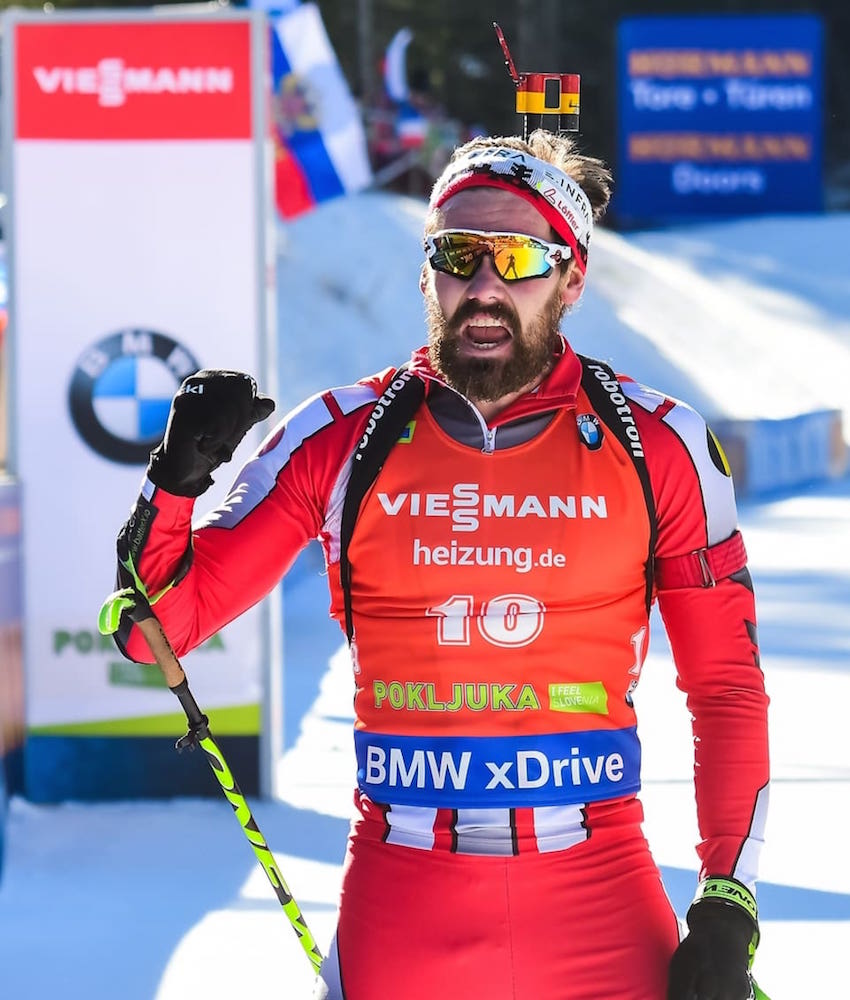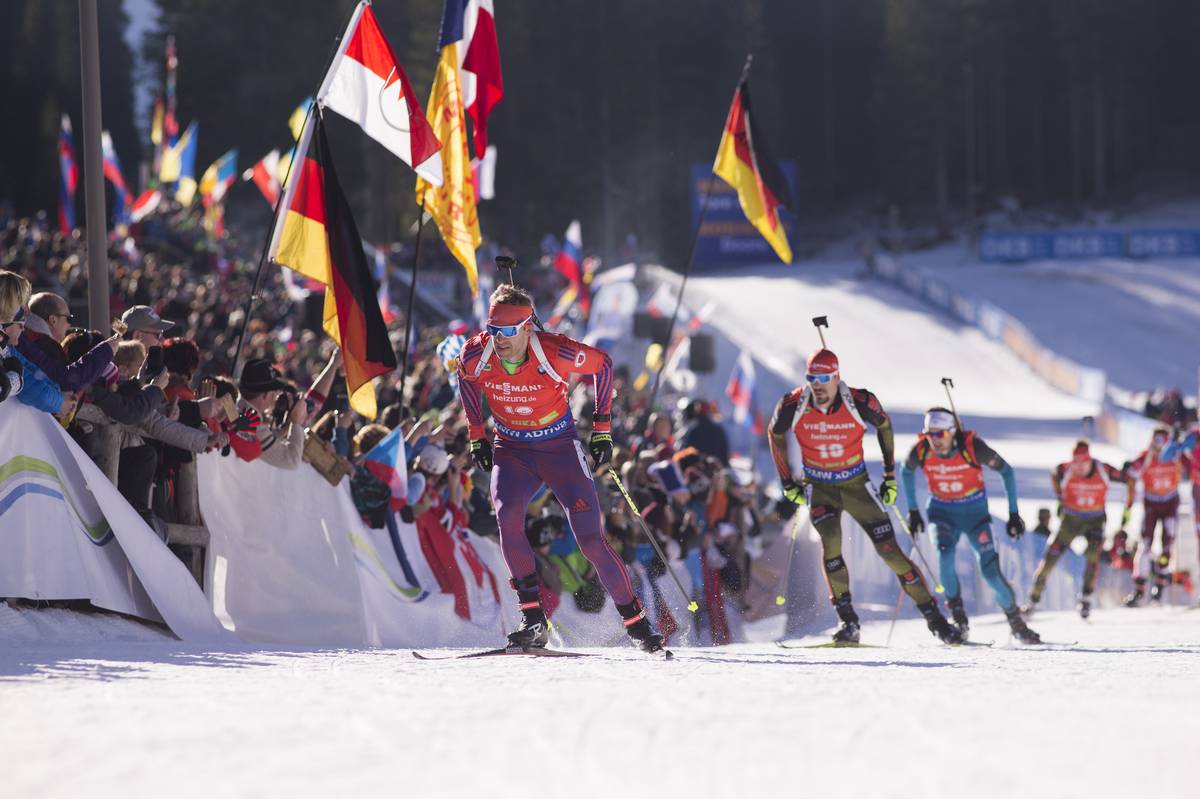
At the top of the starting field in the International Biathlon Union (IBU) men’s 12.5-kilometer pursuit in Pokljuka, Slovenia, a large part of the race on Saturday was determined by two pairs skiing and shooting in almost perfect synchrony together: France’s Martin Fourcade with Russia’s Anton Shipulin, and the two Norwegians Emil Hegle Svendsen and Johannes Thingnes Bø.
For the first three shooting stages, all four athletes shot clean and fast, with Shipulin able to close the gap to Fourcade on the second loop and then each one taking the lead at times.
“That was a great fight against Anton,” Fourcade stated during the press conference. “We did almost the whole competition together. When he [caught up to] me, he asked me to help him. But I was so exhausted I could not help him much on the track. As soon as my shape came back we collaborated together, and that was a great collaboration because Emil was not so far behind. We knew we had to fight together to keep our advantage.”
For the final shooting stage, Fourcade began to shoot first and kept his cool once more while Shipulin missed his second shot, forcing him to ski a penalty lap.
“At the end Anton is always really good, really fast, so I knew I had to stay close…,” Fourcade said. “On the last shooting, I got one more clean [target] than him, so that gave me the win. But that was really tough.”
“I was a little bit nervous,” Fourcade said of the last shooting stage to German broadcaster ZDF. “I needed a little more time for my installation [taking position]. But then when I was focused on my shooting, it was very good. I am very satisfied with my win today. It was a crazy beginning of the season, maybe my best. Even if my shape wasn’t so good today, I managed to do what I needed to be strong on the shooting range. So that’s amazing.”
Behind the two leaders, similarly Svendsen also managed to shoot clean again in the final stage, while Bø missed two targets to finish fourth (0+0+0+2, +48.0). Shipulin came back on the track as Svendsen was also leaving the range. Both were 13 seconds behind Fourcade, and in his current ski shape it was clear that those two would have to fight for second place with nobody directly behind them.
“Like Martin and Anton, we had good collaboration,” Svendsen said at the press conference about racing with Bø for a long time. “It was very difficult to catch any time on those two, they were shooting fast and good, and skiing fast as well. So as Martin said, it was a quite high level in the competition. I am just happy to shoot clean on the last lap; that was the key. Now I am back on the podium, and it feels very good.”

On the last lap into the finish, Fourcade waived and clapped to the spectators in the stands taking out the tempo a bit to ski over the line in a time of 30:27.4 minutes, while just a few seconds behind him Svendsen and Shipulin skated furiously in a sprint on the short finish stretch down from a bridge, which the Norwegian decided for himself (0+0+0+0, +6.0) and the Russian just 0.2 seconds behind (0+0+0+1).
“Anton is for sure one of the best sprinters in the biathlon field,” Svendsen added when asked about the finish. “So I knew it was like a 50/50 chance to beat him. I felt quite strong on the last loop and managed to stay in front, but it was very close. On the last 200 meters he was just on my side, and I managed to get a little more speed on the last hundred.”
The second place was Svendsen’s first podium finish of the season, following some missed time in the last preparation phase in the fall due to an illness.
“I think my mistake was that I wanted too much to shoot zero [misses],” Shipulin commented on his race in the press conference via a translator. Regarding his final lap he added: “I made some tactical mistakes. I felt like on the last loop I didn’t have too much power left. And second of all, to be honest Pokljuka is not the best place to have a strong finish just because of the tricky downhill and uphill, so that’s probably why.”
Fifth place went to Germany’s Simon Schempp, who skied fast and incurred just one penalty in the first standing stage (0+0+1+0, +59.8). Still, that was only good enough to improve by one position from the sprint, not able to close up to Bø and the others.
“Today you could see again how good the shooting results throughout the field are,” Schempp told ZDF. “Then it’s very hard to advance. One miss is a decent result for twenty shots, but just not good enough to make up a little more [time or positions]. But I am very satisfied anyway.”
The weather conditions were sunny with almost no wind again, and a few athletes even decided to start in short-sleeved suits.
“It was a really great competition with great conditions, fair conditions, and that’s what I like in biathlon,” Fourcade explained at the press conference. “We all had the same chances today on the shooting range, you can see it when you look at the result… The level of competition has been amazing this week in Pokljuka.”
“The conditions could not have been better today,” US Biathlon’s Lowell Bailey confirmed in an email to FasterSkier.
Former Olympic Champion with Best-Ever Result for a Belgian
Behind these racers who perennially finish at the top of the field, an international surprise in the race was Michael Rösch for Belgium, improving 10 positions to finish sixth with clean shooting, thus achieving the best biathlon result of all time for his country (0+0+0+0, +1:21.0). At the beginning of his career, Rösch raced for Germany and won an Olympic gold in the men’s 4 x 7.5-kilometer relay at the 2006 Olympics in Torino and three bronze medals at World Championships, before later being cut from Germany’s World Cup team due to inconsistent performances.
Always believing in his ability for a successful comeback, Rösch switched nationalities, missing the 2014 Olympics in Sochi due to bureaucratic problems, and struggled for several seasons to get anywhere close to his former shape. Competing on the World Cup circuit, often as the lone starter for Belgium, having to organize everything himself, he frequently finished outside of the points with, for example, a 45th place in the individual in Oslo as his best World Cup result last season. He also sustained multiple injuries, including an Achilles-tendon tear. Since last summer, Rösch has been training with the Swiss national team and seen a noticeable improvement.
“I’m sorry, it’s just a lousy sixth place in the World Cup, but it means so much to me,” a very emotional Rösch told German broadcaster ZDF with tears in his eyes. “I had to give up so much. My family, my friends, my sponsors always supported me. This is just wickedly great. I tried it again and again and now managed to do it. A sixth place… that isn’t worth much to a lot of people, but it means the world to me.
“On the last lap I thought about my late coach Klaus Siebert,” he continued. “I always said one day I would have a good race again. And today I achieved a perfect race shooting clean four times. I already thought about him on the last lap, I was already crying back then. This is for you Klaus, and also for Bernd, who made my rifle stock, unfortunately they have both passed away. And yeah, you watched the race yourselves. I skied in circles and shot on black targets, the rest is history… This race is for all the people who supported me!”
“I skied in circles and shot on black targets, the rest is history…” — Michael Rösch of Belgium, who achieved sixth for his best result in nearly eight years on Saturday
Bailey Repeats in 18th, Christian Gow Up to 31st

For the U.S., Lowell Bailey missed one target in the first prone stage, which cost him five positions, but remained clean for the next three stages. With that solid performance, he moved into 13th after the final stage, but could not quite hold that place on the last lap, with athletes like Austria’s Simon Eder and Switzerland’s Benjamin Weger overtaking him. Bailey finished with the same position he started with in 18th place (+2:01.6).
“Happy with my shooting but I just don’t have the ski speed I need to compete with the top guys on the tracks right now,” Bailey wrote in an email to FasterSkier. “I’ve had good training all summer so I’m hoping to see my speed improve as the season moves forward.”
As the most consistent North American biathlete so far this season, he leaves Pokljuka in 10th in the overall World Cup standings.
For Biathlon Canada, Christian Gow followed up perfect shooting in the sprint with only one miss in the pursuit to improve on his previous personal best by two places, finishing 31st for a new World Cup best (0+1+0+0, +2:41.7).
“Nothing too crazy happened during my race,” Gow explained in an email. “It was a fun and fast paced race with a lot of jockeying for positions. It was exciting to get in there and race with a lot of the top guys and see what I could do!”
On his final lap, Gow found himself fighting for positions agains top contenders such as Austria’s Dominik Landertinger and Italy’s Lukas Hofer and Dominik Windisch.
“The last lap was tough,” Gow said of that phase of his race. “I didn’t realize it was those guys that were chasing me, but it was not easy to fight with them at that point in the race. All 3 of them skied super well today and I had little chance of being able to stay ahead of them.”
American Tim Burke started his race strong, improving from 53rd at the start all the way to 25th with two clean prone shootings, but he struggled in his standing bouts with five penalties (0+0+2+3). Still, thanks to another good skiing performance with the 25th-fastest overall course time, Burke finished the day in 42nd (+4:09.8), just out of the World Cup points.
Canada’s Scott Gow also shot five misses on Saturday (2+1+0+2) after a clean shooting performance in the sprint, falling back from 23rd at the start to 48th (+4:39.0) at the finish.
Similarly, his teammate Brendan Green had five penalties to finish 57th (1+1+2+1, +5:36.4).
The World Cup weekend in Pokljuka concludes with men’s and women’s relays on Sunday. Since the U.S. only has three members available at this World Cup stage for both the women and men, it will not be able to field a team in either race. Canada is starting the men’s race with Christian Gow, Scott Gow, Macx Davies and Brendan Green (bib 6); and Sarah Beaudry, Rosanna Crawford, Megan Tandy and Julia Ransom (bib 12) for the women.
Harald Zimmer
Harald has been following cross-country skiing and biathlon for some 20 years since the Olympic Winter Games in Albertville and Lillehammer. A graduate of Middlesex University London and Harvard University, he now lives near the Alps where he likes to go skiing, snowboarding and hiking. He is a former track athlete in middle-distance running, as well as a huge NBA fan.



